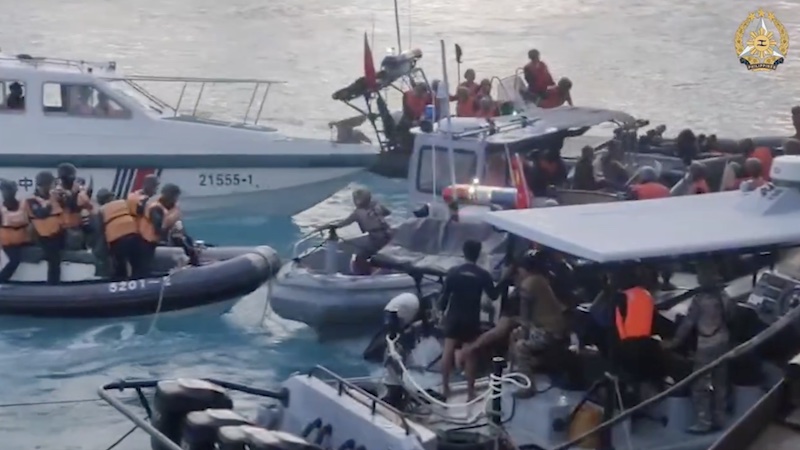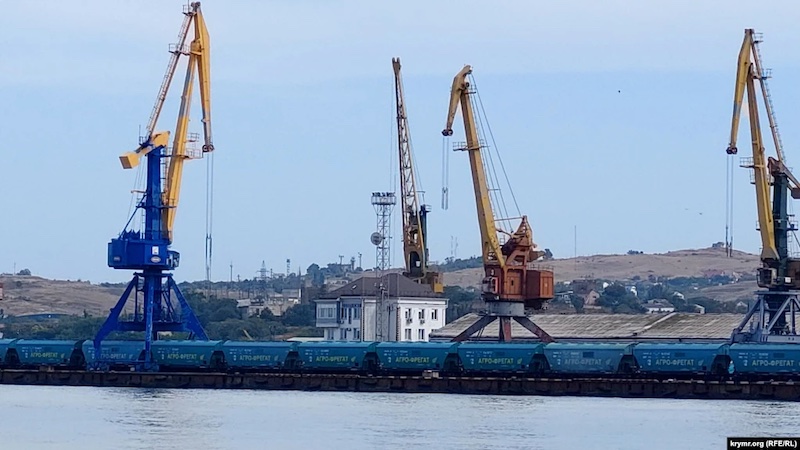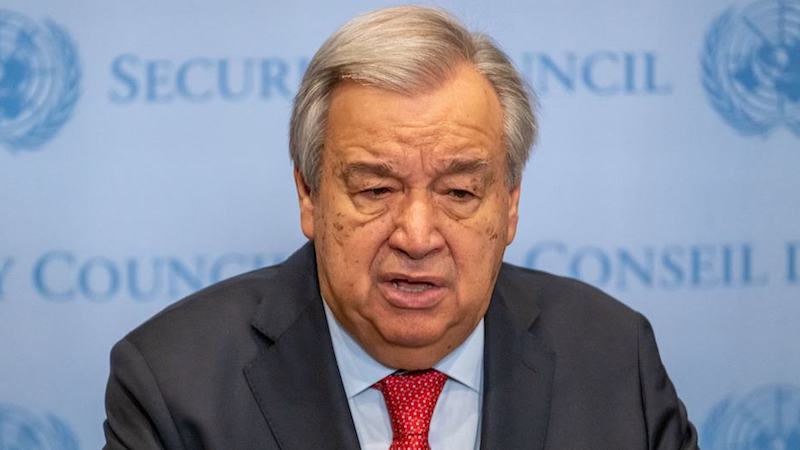
By Jason Gutierrez
The Philippines dismissed calls Friday to invoke a defense treaty with the United States over a highly charged confrontation between the Chinese coast guard and Filipino navy personnel in disputed waters during which a sailor was injured.
After the Philippine military released footage on Wednesday of the chaotic;June 17 standoff;at Second Thomas Shoal in the South China Sea, Philippine nationalist groups and hawkish politicians have been clamoring for the Marcos administration to use that to invoke the;Mutual Defense Treaty.;
The treaty, signed in 1951, binds Manila and Washington to come to each other’s military aid in the event of an attack by an external power. On Monday in the U.S. capital, officials at the White House and State Department condemned China’s alleged conduct at the shoal as “escalatory and irresponsible actions.”;;
“We are not yet ready to consider this as an armed attack,” Lucas Bersamin, the executive secretary of the Philippines who reports to President Ferdinand Marcos Jr., told reporters on Friday when asked if the incident would trigger the treaty with Manila’s oldest security ally.
The Armed Forces of the Philippines (AFP);claimed that during the;encounter, one of its boats was forcibly towed, looted and damaged, and that Chinese personnel used machetes, blades and pikes to threaten sailors and damage equipment. A Filipino sailor lost a finger during the standoff, the AFP said.
The incident was “probably a misunderstanding or accident,” Bersamin said.
A day earlier, Senate President Francis Escudero had described the escalating tensions between Manila and Beijing in the South China Sea as alarming, while he requested a full briefing from the foreign affairs department about the incident.;;
He said the department should now “go beyond the filing of diplomatic protests each time an incident occurs.”
Bersamin said the foreign office had not received an official response from China about the incident, although Beijing had publicly defended its coast guard’s actions in the shoal, which lies within the Philippines’ exclusive economic zone but is claimed by both countries.;
The incident occurred only two days after China’s coast guard began enforcing a;new regulation;authorizing its personnel to intercept and detain foreign boats and crews suspected of “trespassing” in South China Sea waters claimed by Beijing.
For their part, the Chinese accused the Philippine side of attempting to transport firearms and material needed to refurbish the BRP Sierra Madre, a rusting World War II-era navy ship that Manila deliberately grounded at the shoal in the late 1990s to mark its territorial claim there.
A contingent of Philippine marines is stationed aboard the ship, and rotated in and out of the shoal, which is known as Ayungin to Filipinos and Ren’ai Jiao to the Chinese.
“The Philippine vessels secretly carried construction materials and even weapons and equipment, and they deliberately rammed Chinese vessels. The Philippine side threw water and hurled objects [at] Chinese enforcement personnel. These acts clearly escalated tensions at sea, and severely threatened the safety of Chinese personnel and vessels,” Lin Jian, a spokesman for China’s foreign ministry,;said;in a news briefing on Thursday.
“The Chinese side took necessary measures in accordance with law to safeguard its sovereignty, which was lawful and justified and done in a professional and restrained manner. It was beyond reproach,” he said.
During Monday’s incident, which occurred close to the Sierra Madre, small boats from China’s coast guard intercepted a rigid-hulled inflatable boat belonging to the Philippine Navy.
Initial reports from the AFP said that seven Filipino troops were hurt in the skirmish at sea, but on Friday Philippine officials clarified that the sailor who lost a finger was the lone casualty among the Filipinos.;
The Philippines runs regular rotation and resupply missions to the;Sierra Madre. The old ship serves as Manila’s military outpost in the contested waters and lies near Mischief Reef, an artificial island where Beijing built a naval base in the 1990s.
“I think this is a matter that can be easily resolved very soon by us and (if) China wants to work with us, we can work with China,” Bersamin told reporters after he chaired a meeting of the National Maritime Council, a government body established in March to boost Philippine security in the West Philippine Sea.;
Manila refers to South China Sea waters within its exclusive economic zone (EEZ) as the West Philippine Sea.
“As a result of the meeting today, the [National Maritime Council] agreed on policy recommendations for the President’s consideration,” Bersamin said.;
“Among these recommendations is the announcement of the rotation and reprovision missions to the BRP Sierra Madre in Ayungin Shoal, which will remain routinary and scheduled regularly.”;
“We will not yield and will not be deterred in fulfilling this duty,” he said, adding that it would be wise for the president to accept the recommendations and publicize the schedule of the government’s activities.
Jojo Riñoza and Mark Navales contributed reporting from Manila.





